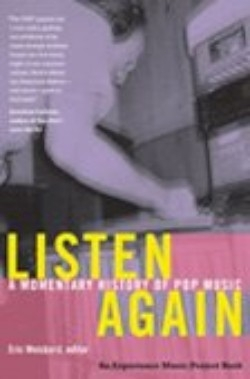It looks like you've stumbled upon a page meant to be read by our code instead of viewed directly. You're probably looking for this page.
Listen Again
A Momentary History of Pop Music
Anthologies of music criticism seldom sing. The subject matter is too arcane or the writing too elliptical, saturated, or otherwise uneven, but Listen Again largely avoids these weaknesses by keeping academic and fan club excesses to a minimum.
The nineteen essays and commentaries here were originally presented at the annual Experience Music Project conferences, and tend to pinpoint seminal moments in the lives of specific performers or musical trends. A couple of these pieces—notably “Magic Moments, the Ghost of Folk-Rock, and the Ring of E-Major” and “ORCH5, or the Classical Ghost in the Hip-Hop Machine”—require some formal knowledge of music to follow. This book being the province of scholars and not radio programmers, the lines between the different kinds of music discussed are not all that distinct, but clearly the types include (in various shadings) rock, folk, punk, dance, soul, disco, hip-hop, and country.
Ned Sublette’s “The Kingsmen and the Cha-Cha-Cha” is a fiercely footnoted study of how Cuban music, starting with the slave trade, has shaped what is now considered American music. “I’ve come to think of Cuban music as the fundamental of the New World,” he declares. In pursuing this theme, he ping-pongs from the forests and savannahs of Africa to the infectious rhythms of Desi Arnaz on I Love Lucy. Holly George-Warren resurrects a pop/country princess from the 1960s and ’70s in “Mystery Girl: The Forgotten Artistry of Bobbie Gentry” and explains what happened to the writer of the mythic “Ode To Billy Joe” and “Fancy” after she vanished from the music scene.
Franklin Bruno traces Jerry Leiber and Mike Stoller’s “Is That All There Is” from its origin in an early Thomas Mann story through Peggy Lee transforming it into a hit, as well as later incarnations. Jason King peers into the musical and political ramifications of Roberta Flack’s vocal style in “The Sound of Velvet Melting.”
To a degree, the collection is a case study of zealots talking to zealots, of their discovering and holding aloft facts and opinions that the casual musical fan would care little or nothing about. For those who regard music as a key to unlocking larger cultural truths, however, the title is sound advice.
Reviewed by
Edward Morris
Disclosure: This article is not an endorsement, but a review. The publisher of this book provided free copies of the book to have their book reviewed by a professional reviewer. No fee was paid by the publisher for this review. Foreword Reviews only recommends books that we love. Foreword Magazine, Inc. is disclosing this in accordance with the Federal Trade Commission’s 16 CFR, Part 255.
